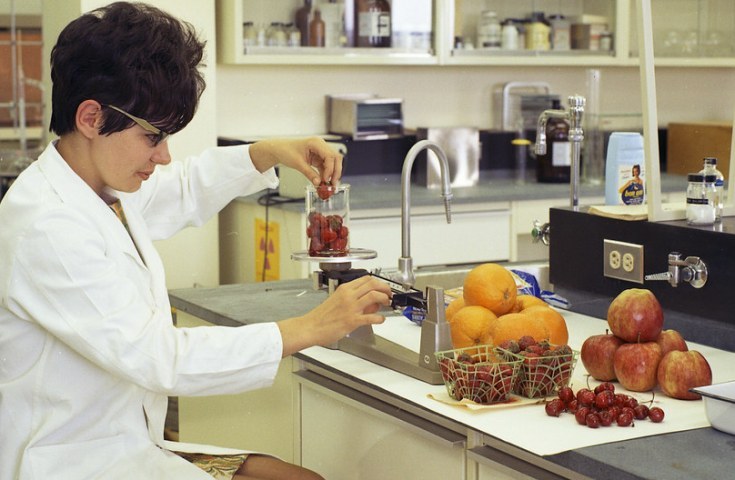IAEA and FAO cooperate in supporting food safety in Burkina Faso and Algeria
To celebrate World Food Safety Day, held this week, we are drawing attention to the importance of nuclear techniques in monitoring food safety.

The IAEA and the Food and Agriculture Organization of the United Nations (FAO) cooperate in supporting food safety and food quality programmes around the world to address food hazards, food fraud and advise countries on food irradiation. Among the beneficiaries of this programme have been Burkina Faso and Algeria. To celebrate World Food Safety Day, held this week, we are drawing attention to the importance of nuclear techniques in monitoring food safety. “Safe food today for a healthy tomorrow” – this year’s theme – recognizes how safe food contributes to a healthy life, economy, planet and future.
Enhanced food safety capabilities in Burkina FasoTiny but oil- and vitamin-rich sesame seeds have become a staple of Burkina Faso’s economy – creating jobs and generating income. After cotton, the edible seeds that grow in pods have become the West African country’s second most exported agricultural product. This sprouting success in the last decade has been sustained with the help of Burkina Faso’s National Public Health Laboratory (LNSP), supported by the IAEA and FAO, through their Joint Centre on Nuclear Techniques in Food and Agriculture.
The key mission of the LNSP, founded in 1999, is to ensure the safety and quality of both imported and exported food. Strict regulations on pesticide residues apply on sesame exports, and, in recent years, the laboratory has played an important role to ensure that the country’s exports meet food safety and quality standards. From 2010 to 2016 alone, sesame exports represented about 47 per cent of agricultural product exports. Total exports increased from 20 600 tonnes in 2007 to 160 000 tonnes in 2016 and up to 183 786 tonnes in 2018, with export earnings topping the US $170 million.
"LNSP has contributed to this performance by conducting the safety and quality control of sesame seeds, and this has also been possible with the support provided by the IAEA, in collaboration with FAO," said Bernadette P. Sourabie, Director of Technical Coordination and Quality Management at LNSP. However, the lab needed to further improve its analytical capacity so that rapid and cost-effective screening capabilities could be applied to a wider range of chemical hazards in food.
Since 2018, the IAEA – through its technical cooperation programme – has provided additional analytical equipment, including a radioreceptor assay instrument and trained a pool of analysts in the testing of three groups of chemical hazards: mycotoxins, pesticide residues and veterinary drug residues in food products of animal and plant origin. Analytical method protocols have also been provided to enhance the testing programme.
Mycotoxin contamination in cereals/grains and livestock products is a common challenge to food safety. Mycotoxins could create serious health risks in human and animal species and, subsequently, hinder trade. The IAEA and FAO have assisted LNSP in the set-up of a mycotoxin analytical laboratory and the training of its staff. Thousands of food samples are analysed each year by LNSP local experts for mycotoxins. “This mycotoxin-analytical capacity at LNSP has thus contributed to protecting public health through the systematic control of imported food, as well as exports. The mycotoxin laboratory also serves as a platform for training students from public and private universities in Burkina Faso and in the subregion,” said Fulbert Nikiema, Director of Food Control and Applied Nutrition at LNSP.
Sourabie added that "LNSP is looking towards addressing the challenge of attaining accreditation according to ISO 17025:2017 and to enhance international recognition. We are counting on the IAEA for the necessary support, complementing Government and institutional commitment. We are grateful for the support that is being provided through several proficiency/interlaboratory testing schemes in this initiative."Enhancing food safety analytical capabilities in Algeria Laboratories in Algeria has received the support to enhance their analytical capabilities for the detection of chemical hazards, including antimicrobial and pesticide residues in a range of food, from poultry and eggs to dates and honey. Algeria was the world’s sixth-leading exporter of dates, worth approximately US $129 million in 2020.
Through the IAEA’s technical cooperation programme and in partnership with FAO, staff of the Algerian National Institute for Agronomic Research (INRAA) and the National Institute of Veterinary Medicine (INMV) have been trained in methods of analysis and supported with the required analytical equipment. These institutions are now equipped to contribute towards consumer protection and the trade of agricultural products.
Food safety certification and regular laboratory testing for contaminants can boost market and consumer confidence. "With the enhanced laboratory capabilities, efforts are ongoing to establish public and private partnerships to better serve end-users, such as beekeepers and honey producers; technical and research institutions; as well as universities, among others. This will improve the local honey supply chain,” said Mounira Azouz, Research Scientist at INRAA.










